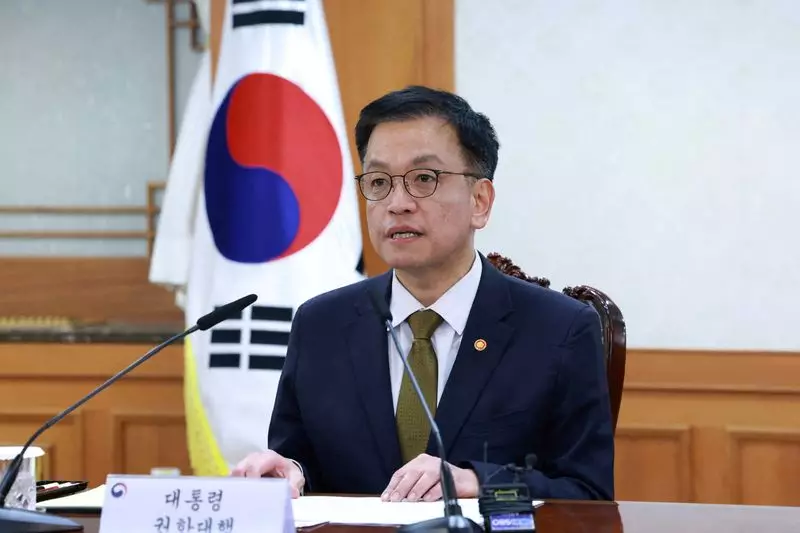The geopolitical landscape in East Asia is undergoing significant transformation, particularly in relations between South Korea and the United States. With Donald Trump having recently begun his second term as President, there is a palpable sense of uncertainty within South Korea regarding the direction of bilateral relations and the potential implications for its economy. This piece aims to analyze current dynamics under the Trump administration, highlighting the concerns and strategies being articulated by South Korean officials.
South Korea is currently grappling with a complex political crisis that has resulted in some of the most tumultuous leadership changes in recent history. Following the impeachment of prominent leaders, including President Yoon Suk Yeol and Prime Minister Han Duck-soo, the nation is left under the stewardship of Acting President Choi Sang-mok. His interim governance comes at a challenging juncture when South Korea is expected to solidify its strategic ties with a changing U.S. administration, while simultaneously addressing domestic political instability.
Choi has expressed a commitment to enhancing cooperation with the U.S. and sustaining the longstanding alliance, characterized by the slogan “We Go Together.” However, the insistence on a bilateral relationship that progresses in a reciprocal manner underscores a noticeable caution in South Korea’s approach. Recent geopolitical events suggest that such aspirations may be difficult to realize, particularly given the reality of U.S. policies that could reverberate adversely through South Korea’s economy.
Choi Sang-mok has made it clear he is willing to engage with President Trump at the earliest convenience, signaling South Korea’s desire to cultivate collaborative ties. A proposed phone call to articulate shared values is an essential step toward stabilizing relations. Yet, the backdrop of strained diplomatic engagements raises questions about whether such conversations will yield productive results. The symbolic representation of South Korea at Trump’s inauguration, primarily featuring Ambassador Cho Hyun-dong instead of high-ranking governmental figures, accentuates a narrative of diminished presence in U.S. diplomatic circles.
The absence of significant South Korean representation contrasts sharply with other nations like China and Japan, whose high-level delegations sought to reinforce their commitments. Such disparities create a perception of South Korea’s diminished influence, potentially heightening challenges in negotiating future agreements.
Economic Implications and Concerns
Economic anxieties are dominantly foregrounded in discussions about the U.S. under Trump’s leadership. The potential reimposition of tariffs and proposed regulatory changes surrounding electric vehicles pose tangible threats to South Korea’s export-driven economy. These developments are particularly alarming given that South Korea recorded a record-high trade surplus of $55.7 billion with the U.S. in the previous year, indicating a rich but vulnerable economic relationship.
Choi acknowledged the importance of these policies and indicated that Seoul would undertake a thorough review of response measures to directly counter these challenges. The potential for U.S. tariffs could disrupt supply chains, thin profit margins, and prompt South Korean firms to reconsider their operational strategies in the U.S., particularly in sectors like automotive and electronics, where competition is fierce.
The strategic military alliance between South Korea and the U.S. also faces scrutiny. President Trump has previously demanded South Korea contribute a larger share toward the cost of the nearly 28,500 U.S. troops stationed on South Korean soil to deter North Korean aggression. This demand continues to generate tension, particularly in light of recent agreements that had established more predictable cost-sharing frameworks.
The Trump administration’s unpredictability on defense spending has the potential to ripple through operational readiness and military preparedness. Analysts warn that heightened financial obligations could strain budget allocations within South Korea, forcing the government to juggle between defense expenditures while addressing citizenship concerns and social obligations at home.
South Korea finds itself at a pivotal moment characterized by rising apprehensions regarding U.S. policies under Trump. Efforts by Acting President Choi to establish a constructive dialogue with the new U.S. administration illustrate a recognition of the importance of maintaining robust ties. However, with domestic political challenges and consequential economic threats looming, South Korea must balance its commitments to the traditional alliance with adaptive strategies that safeguard national interests amidst an uncertain geopolitical climate. The path forward will require nuanced diplomacy, strategic foresight, and resilience to navigate an evolving partnership with the United States.

